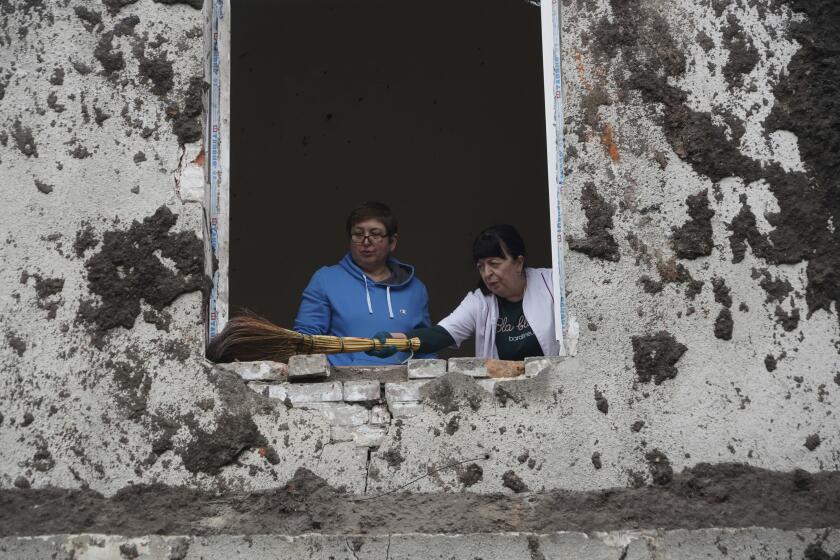Obama prepares to explain his Syria strategy to a skeptical nation
WASHINGTON – Preparing to deliver a rare prime-time White House address, President Obama on Tuesday found himself unexpectedly tasked with a dual challenge: bolster public support for his decision to launch military strikes against Syria while explaining his decision to pursue a diplomatic alternative.
The almost contradictory messages reflected the unsettled state of affairs in the standoff with Syria over a reported nerve gas attack in Damascus suburbs nearly three weeks ago. The White House and U.S. allies worked quickly to explore the viability of a Russian proposal to put the Middle Eastern nation’s chemical weapons stockpiles under international control.
The Obama administration declared it was skeptical that the government of Syrian President Bashar Assad would follow through with the plan. Still, in meeting with senators on Capitol Hill, Obama asked lawmakers to give him time to sort through the options. Senate leaders, in a sign of the deep reluctance to endorse the president’s push for another military intervention, readily complied.
But the president’s speech from the East Room was announced before Russia’s plan emerged. While diplomats in Paris, Damascus, Moscow and Washington worked through the details – running into early signs of the difficulty of crafting a workable plan – Obama continued his public relations campaign.
The speech, which aides rewrote on the fly, was designed as the keynote of a week of meetings, briefings, speeches and phone calls aimed at lawmakers whom Obama needs to win over in his pursuit of congressional authorization for a strike against the Syrian government.
But on Capitol Hill, resistance to entering another Middle Eastern war seemed to firm up with the sudden appearance of the Russia alternative.
Senate Majority Leader Harry Reid (D-Nev.) indefinitely postponed an initial vote on an authorization resolution approved by the Foreign Relations Committee last week. Reid said he would be satisfied with a diplomatic solution.
“I’m not a blood-and-thunder guy. I’m not for shock and awe,” he said.
Meanwhile, key senators began to draft language that would incorporate the Russian offer, perhaps authorizing force only if Syria refused to allow an outside entity, most likely the United Nations, to secure its chemical weapons stockpile. It could also demand a U.N. resolution condemning Syria for using chemical weapons on its people, a charge the Syrian authorities have repeatedly denied.
Sen. Carl Levin (D-Mich.), chairman of the Armed Services Committee, emphasized that the resolution was still being crafted. But he said the goal was to eliminate the threat of Syria using chemical weapons by keeping open the possibility of force, “like the Sword of Damocles over Assad.”
“It’s because of the threat of a strike by the president, because of the possibility that Congress would authorize it, that there’s movement at the U.N. So you’ve got to find a way to keep that pressure on. That’s the key to success at the U.N.,” Levin said.
The president told Democrats he needed a number of days to pursue the diplomatic channels. But he “was not overly optimistic,” said Sen. Richard Durbin (D-Ill.), the assistant majority leader.
“What he’s basically asked is for some time to work this out,” Durbin said, a time frame that would delay any action until next week. “I think that’s reasonable. We want this to end well, we want the end of chemical weapons in Syria. And if we can achieve that through the president’s threatened use of military force, that’s a good thing for safety in the world.”
Obama, along with his French and British counterparts, agreed Tuesday to explore the proposal with Russia and China, Syria’s allies on the U.N. Security Council. The two countries have used their veto power to block previous punitive measures targeting Assad’s government.
Obama spoke with French President Francois Hollande and British Prime Minister David Cameron separately Tuesday. An advisor to Obama said the administration intends to seek a U.N. Security Council resolution that would require the Syrian government to turn over all its chemical weapons.
But Russian President Vladimir Putin said U.N. action would come to fruition only if the United States and allied nations agreed to forgo military action against Syria.
“It is difficult to make any country – Syria or any other country in the world – to unilaterally disarm if there is military action against it under consideration,” Putin said, according to Russia’s RT news service.
The European Union, which was wary of military action, also welcomed the proposal, as its top diplomat urged quick work on the nettlesome details involving the verification and destruction of the arsenal.
“The EU stands ready to fully support any proposal and its implementation,” Catherine Ashton said.
Support from the EU, which has 28 members, added to the diplomatic momentum behind an idea that began as almost an offhand comment Monday by U.S. Secretary of State John F. Kerry in London/ Moscow seized on the idea and France – the most vocal ally in support of an armed reprisal against Assad’s government – said Tuesday that it would introduce a U.N. resolution.
French Foreign Minister Laurent Fabius, who said he greeted the Russian gambit “with interest and caution,” told Le Point magazine that it would be acceptable only if Assad “complies without delay in putting all his chemical weapons under international control and allowing them to be destroyed.”
Cameron told lawmakers the proposal needs to come before the U.N. Security Council as a resolution that includes a timetable, process and consequences if Syria reneges. “What’s important is to make sure this isn’t some delay tactic, that this isn’t some ruse,” he said.
Syria confirmed Tuesday that it accepted the Russian plan, based on the understanding that it could prevent a U.S. military strike.
“We agreed with the Russian initiative, proceeding from the understanding that it must cut the ground from under the feet of the U.S. aggression against our country,” Syrian Foreign Minister Walid Moallemsaid during a meeting with the speaker of Russia’s lower house of parliament, Sergei Naryshkin.
Russian Foreign Minister Sergei Lavrov said he was working with Syria to draft a proposal and planned to deliver it soon to U.N. Secretary General Ban Ki-moon. But in a sign the effort could still falter, he also said a resolution that France was preparing to submit to the U.N. was “unacceptable” because it held Syria responsible for the use of chemical weapons.
Both Syria and Russia maintain that a poison gas attack in pro-rebel suburbs of Damascus was the work of rebels, not the Syrian government.
On the Hill, the president’s threat to strike Syria continued to draw new opposition, including Senate Minority Leader Mitch McConnell (R-Ky.), whose decision conflicts with the support offered by House Speaker John A. Boehner (R-Ohio), who reaffirmed his support for military action.
“I believe it’s important to try to help the president provide a unified front,” Boehner said, even as he made a nod to his own problems rounding up votes. “It’s a very difficult issue for Congress.”
The split between the two top GOP leaders in Congress comes as McConnell, who is running for reelection next year, aligned himself with the tea party wing of the GOP, which has gained influence at the expense of traditional defense hawks. McConnell said he did not believe limited strikes would deter Assad from using chemical weapons.
The two Republicans both raised concerns about the Russian proposal. Boehner said he was skeptical because of the “actors that are involved,” but McConnell said it is “worth exploring.”
ALSO:
1 in 4 men surveyed in Asia-Pacific say they committed rape
Voice of Iran hostage crisis tapped as VP, environmental advocate
Egypt bans thousands of unlicensed preachers from giving sermons
christi.parsons@latimes.com
Twitter: @cparsons
michael.memoli@latimes.com
Twitter: @mikememoli
paul.richter@latimes.com
Twitter: @richtpau
Times staff writers Henry Chu in London, Sergei L. Loiko in Moscow, Lisa Mascaro and Kathleen Hennessey in Washington and special correspondent Kim Willsher in Paris contributed to this report.
More to Read
Start your day right
Sign up for Essential California for news, features and recommendations from the L.A. Times and beyond in your inbox six days a week.
You may occasionally receive promotional content from the Los Angeles Times.








